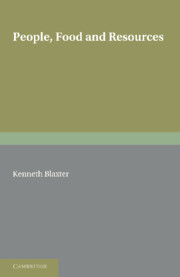7 - LIMITS AND RESOURCES
Published online by Cambridge University Press: 06 July 2010
Summary
THE LIMITS TO THE YIELDS OF CROPS
When the algebraic expression of Malthus' contentions was explored in Chapter 2, the concept of the carrying capacity of an area of land was introduced. This concept can be enlarged to include the world as a whole and the question asked, ‘How many people could the land resources of the world really support?’ Neglecting for the moment the needs of man for biological products other than food, the answer obviously depends on the area of land which can be made to yield food and the yield per unit area. The potential land area of the world has already been discussed; here consideration is given to the potential yield of crops per hectare of land.
Two estimates of potential yield can be employed. The first is simply the maximal yields ever recorded for particular crops, that is yields which represent what can be achieved through superlative husbandry, using optimal inputs of fertilisers and agrochemicals. Some of these record yields for different crops are summarised in Table 18 from which it is clear that they depart from average yields very considerably. It can also be inferred that there is considerable potential for increasing the average yield of these crops on a world-wide basis. The second approach is to calculate the yield which can be expected from the solar radiation intercepted, using modern knowledge about the biological factors involved in the transduction of the energy of solar radiation to that of the organic molecules which the plant synthesises.
- Type
- Chapter
- Information
- People, Food and Resources , pp. 85 - 97Publisher: Cambridge University PressPrint publication year: 1986



